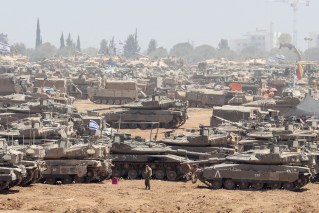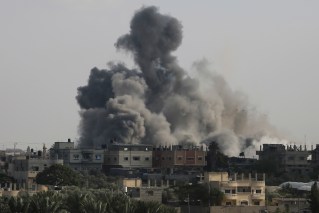Biden requests military meeting from Netanyahu


Over one million Gazans, half the population, are experiencing "catastrophic" shortages of food. Photo: AAP
US President Joe Biden has voiced “deep concerns” over Israel’s plans for a major operation in Rafah during a phone conversation with Israel’s Prime Minister Benjamin Netanyahu, according to the White House.
Netanyahu agreed to a request from Biden to send a senior delegation of military leaders to Washington to discuss the issue further, CNN reported.
The meeting would occur at the end of this week or early next week, US national security adviser Jake Sullivan said.
Parts of Gaza already exceed family levels: monitor
Mass death is now imminent without an immediate ceasefire and surge of food to areas cut off by fighting, the global hunger monitor said.
The Integrated Food-Security Phase Classification (IPC), whose assessments are relied on by UN agencies, said on Monday that 70 per cent of people in parts of northern Gaza were now afflicted by the most severe level of food shortage, far exceeding the 20 per cent famine threshold.
In a famine, food shortages are followed first by widespread malnutrition and then mass deaths.
The IPC said malnutrition is probably already at famine levels; it did not have enough data on death rates, but estimated residents would be dying at famine scale imminently, and children under four may already be.
“The actions needed to prevent famine require an immediate political decision for a ceasefire together with a significant and immediate increase in humanitarian and commercial access to the entire population of Gaza,” it said.
“All efforts must be made to ensure the provision of food, water, medicines, and protection of civilians, as well as to restore and provide health, water, and sanitation services, and energy.”
In all, 1.1 million Gazans, around half the population, were experiencing “catastrophic” shortages of food, the worst category, with around 300,000 in the areas now facing the prospect of famine-scale death rates.
The prospect of a manmade famine in Gaza has brought the strongest criticism of Israel from Western allies since it launched its war against Hamas militants following their deadly attack on Israeli territory on October 7.
Tweet from @Israel_katz
“In Gaza we are no longer on the brink of famine, we are in a state of famine, affecting thousands of people,” EU foreign policy chief Josep Borrell said at the opening of a conference on humanitarian aid for Gaza in Brussels.
“This is unacceptable. Starvation is used as a weapon of war. Israel is provoking famine.”
Israeli Foreign Minister Israel Katz responded that Borrell should “stop attacking Israel and recognise our right to self-defence against Hamas’ crimes”.
UN Secretary-General Antonio Guterres called the IPC report an “appalling indictment” and said Israel must allow complete and unfettered access to all parts of Gaza.
“This is an entirely manmade disaster — and the report makes clear that it can be halted.”
Israel, which initially allowed aid into Gaza through only two checkpoints on the enclave’s southern edge, says it is opening more routes by land, as well as allowing sea shipments and air drops.
The first boat carrying aid arrived last week.
Aid agencies say they still cannot get enough supplies through or distribute them safely, especially in the north, and that access and security are Israel’s responsibility.
Assault on hospital
In the ruins of Gaza City, the main settlement in the north of the Gaza Strip, Israeli forces launched a major assault on Al Shifa hospital overnight.
Once the Gaza Strip’s biggest hospital, it is now one of the only medical facilities still even partially functioning in the north of the territory.
Israel said it had killed 20 Hamas fighters, including a senior Hamas commander, Fayeq al-Mabhouh, in the hospital.
The Hamas-linked Shehab news agency described Mabhouh as a security official overseeing protection of aid shipments.
Residents described some of the heaviest fighting in northern Gaza for months.
Negotiations for a ceasefire in the war, now in its sixth month, were due to resume on Monday, but an Israeli official said nailing down any deal would probably take at least two more weeks as the two sides are locked in a stalemate.
Israel says it will discuss only a temporary pause in fighting; Hamas says it will not free its hostages without a deal that would end the war.
—AAP








